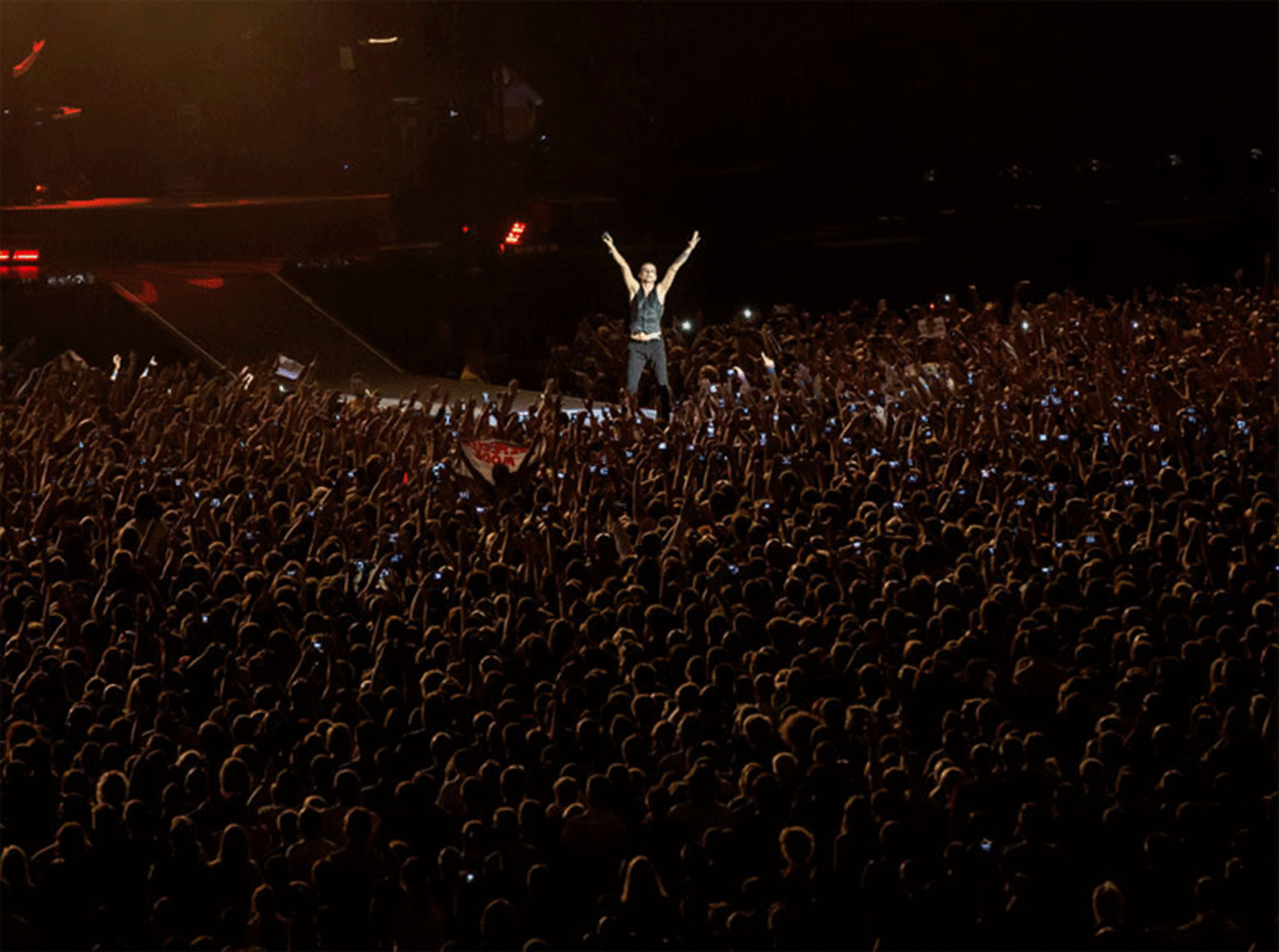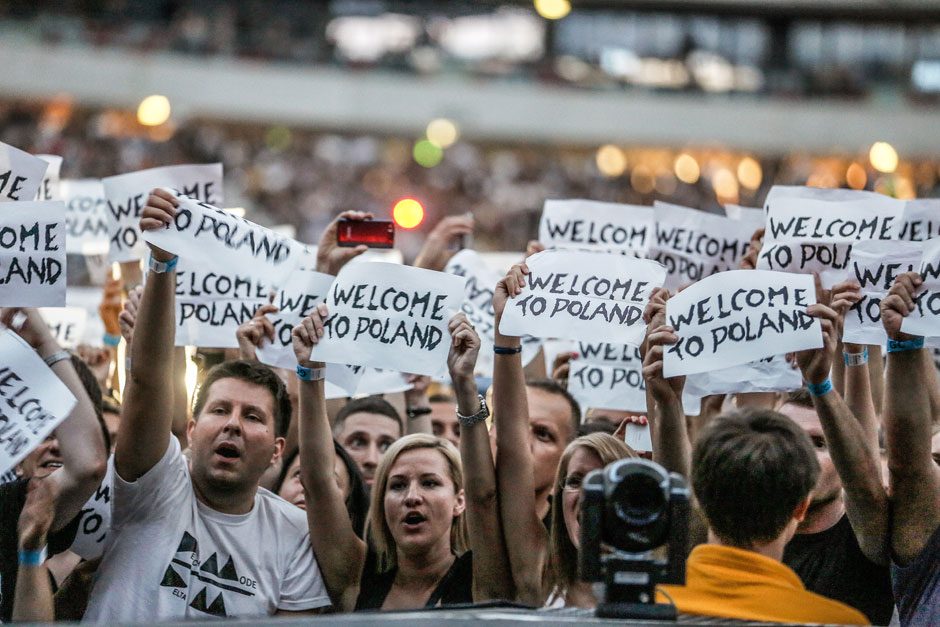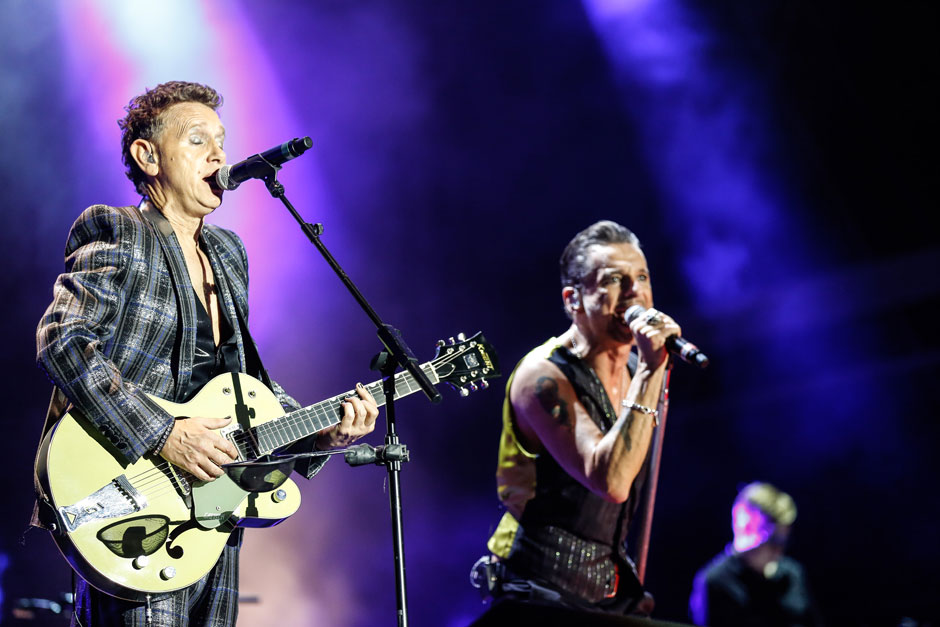
Live Report: Depeche Mode in Warsaw, July 25, 2013
Published July 26, 2013. Words by agatapyzik.
In our final report from Depeche Mode’s summer 2013 European tour, Agata Pyzik, author of the forthcoming book Poor But Sexy—on the cultural clashes between the East and West during the cold war—ponders their enduring appeal. All photos by Maciej Paluchowski.
“This is the closest I’m ever going to get to seeing The Rolling Stones,” says my partner after the Depeche Mode gig ends. It’s true—the same kind of ritual going on, the same complete synchronization between the band’s behavior and the reaction of fans, the same ecstatic worship, the same songs rehearsed thousands of times at thousands of stadium gigs. Live, Depeche Mode are incredibly rocky, male, heavy and sweaty, they look like the most macho band alive—and mostly due to Gahan, whose every blink from a mascara-heavy eye, every movement of his body, every shake of his bum is the most self-aware camp construction I’ve ever seen.
But the audience they appeal to is very different. There’s no mystery why the band attracted a cult following especially in Germany, Eastern Europe and Russia: they were always pressing all our buttons. Coming to us during the cold war, they offered a sexy taste of the West, while making numerous references to the toil of the Eastern man. But the instant appeal was also due to the conscious simplicity, absolute sincerity and their famously basic lyrics, which anybody could understand or memorize. In Poland they attracted en masse students of technical schools and youth with working class backgrounds, for the fact they were truly a ‘no BS’ band: everything was there, in the open, with a strong image, with the years evolving from playful & kinky to muscular, sweaty and macho. The haircut “a la Depeche” from the 80s, with the shaved sides, is still a frequent demand in Warsaw’s hairdresser’s salons, and the discipline of the DM fans is legendary—at 6pm a stream of black-clad folk was already streaming by the Poniatowski bridge towards the National Stadium, proudly presenting a collection of DM t-shirts with all the band’s iconography, making them unusually elegant.

So even if the gig opens with several songs from Delta Machine, which the public don’t know so well yet, it doesn’t matter, because we all know the hits will soon follow. Squirming and doing his little ‘Dave dance’, wearing an unbuttoned waistcoat on a heavily tattooed, muscular and tanned torso, Gahan is the most over the top, queered-up of performers, even if his every move is calculated. Depeche have mastered the incredible art of turning a stadium concert for 50,000 people into a seemingly intimate experience—you always think he sings just for you. Music for the masses, but with a personal Jesus. In the late ’80s/’90s they hit gold with the combination of sex, sin, guilt and sacrifice, all this “pain that I’m used to” in any number of combinations—a mathematics of suffering. And even if they try to keep the balance with playing a bit from every period, they’re at their best from the mature ’90s, marked by Gahan’s clinical death among other things, with an exceptionally ferocious performance of “Barrel of a Gun” from the brilliant Ultra.
They weren’t always these sweaty masochists. They started out after all as a jolly synthpop group, with the saccharine, ecstatic “Just Can’t get Enough”, which gets played as an encore, the one song from this neglected early period. Then they recorded by the Berlin Wall, and took abundantly from lesser known, more pioneering and outré bands. They took metaphors of the relation between S&M and society and the black leather from DAF, they took seedy metropolitan sleaziness from Soft Cell, and finally, borrowed found objects and concrete sounds from Einstürzende Neubauten, perfecting this image on Construction Time Again and Some Great Reward. The cold war atmosphere they were immersed in was simplified into incredibly catchy tunes. They were also incredibly good-looking. So they became massive in the way their counterparts never did. In the ’80s they were knowingly appealing to both East and West (i.e. America), playing upon the themes of capitalism vs socialism, teasing us in their videos with Potemkinesque battleships, Red Army uniforms and heavy industry. But funnily enough, when “Halo”, from 1990’s Violator, gets played tonight, speaking of some “walls coming tumbling down,” with a big image of the Reichstag on the screen, it sounds forced and insincere—they were better at referencing the Wall when it actually stood.
But around Music for the Masses they achieved their trademark anthemic, grandiose style, perfected on songs like “Stripped” or “Never Let Me Down Again”, and then the tortured, synthetic, smoky blues of “Personal Jesus” and “I Feel You”. That’s why when the audience hears the intro to “Enjoy the Silence” in particular, the excitement reaches zenith—in Warsaw it’s palpable. It’s also their manifesto, the famous lyrics are DM in a nutshell: “words are very unnecessary”, “feelings are intense, words are trivial.” They based the rest of their career solely on the intensification of this, while endlessly vaguely dwelling on the dialectics of sex, sin, atonement and the final release. That’s also the reason they’re a tough writerly topic—how long we can focus on the endless permutations of violence, sex and punishment? Writing on Depeche, one is challenged to participate in this collective emotion.

And after all, live they’re everything one could demand. They have complete mastery over the public, perform with the utmost ferocity and don’t spare themselves, playing for over two hours. Speaking of individual performances, despite the absolute rule of Gahan’s ego over the stage, it’s Martin Gore—as we know, the actual author of most of the songs and words—who pulls the strings silently, a realization driven home especially when he gets to sing, as on the acoustic version of “Shake the Disease”. Although originally sung by Gahan, we know, not only from Martin’s appearance in the song’s video, that it comes straight from Gore’s experiences: this tortured confession of a wayward lover, consumed by unspeakable perversions, yet still hoping and yearning for forgiveness and understanding from his inamorata, couldn’t belong to anyone else.
So often heavy-handed, literal, simplistic—even didactic, given how often the crime must immediately meet its punishment, the lyrics of Martin Gore always hit upon something, always move. The band retain a pure mystique: how come this deadly serious, completely devoid of any sense of irony shtick works so well and for so many years? You never know what is really behind those deadpan confessions of sin, guilt, pain, perversions, redemption, heaven and hell—but it doesn’t really seem to matter.~

